I was able to interview Artistic Director of The Westside Comedy Theater Sean Casey. What grabbed my attention from them is there 110 percent support of their improvisors. A few weeks ago they encouraged their house teams to go to festivals across the country and guess what? They would foot the bill for submission fees! It’s all about support and that’s what I’ve witnessed at Westside Comedy!
What’s the history of Westside?
It’s hard to talk about the history of the Westside without bringing up the history of Mission IMPROVable, because really the Westside’s the brick and mortar home for MI. We’ve ass-ended into a pretty amazing standup scene and have been open to all the new voices in sketch, storytelling, web video screenings, etc., so I don’t want to take anything away from that. But at the end of the day there was a theater that did mostly comedy in Santa Monica, and Mission IMPROVable bought it to create M.I.’s Westside Comedy Theater.
Backing up a bit, back in the 90s, when Chumbawumba was KING, a group of friends were doing improv at UMass Amherst in a group called Mission IMPROVable. It’s still there, although what the student group is and what we are is different now, and I imagine if anyone had it all to do over again, we’d all agree to pick a name that was much bigger pun. The group moved to Chicago (I was not part of this first wave, so I call these the ‘Dark Years’) and did what many of us do – go batshit crazy taking as many classes and doing as many improv shows as you can. The difference was they understood there was a business underneath there somewhere. They created a delightful high energy short form show and tried it out on the college market. The crew was tight and this was right when Whose Line had juuuuuust become popular, so it caught on. After a year of touring, they brought in some real talent like myself and a few others, which was smart. Not because I’m a huge dick and think the show only got funny when I came on. That’s just not true. But they got comfortable, early on, letting other people share the light of their campfire. I think this is important and why the group continues to flourish. I had no part in setting that original tone, but I echo that sentiment as much as I can in running the Westside. I should also drop a shout out to Liz Allen, our coach, and amazing human being.
We toured cross country, traveling to gigs by van – 6 people packed in with stretches of 10+ hours between gigs. Nothing. NO THING will forge you closer together than tiny confines and the endless fields of America. Road Trip times forever. Spending that much time together, there’s no ability to not be yourself. You want group mind? Try smelling farts and correctly guessing what that person ate for breakfast. Or not guessing because everyone was at breakfast together. That show continues. The latest cast is excellent, BTW. As much as we can, we will always source our best people from the cast of the Mission IMPROVable show because anybody who survives on the road and finds peace, comedy and themselves through that is pure gold forever and ever.
So, what happens after tour ends for you? I think the record is 3 and a half years on the road before burning out. It’s not that the colleges change, or the bars, or CiCi’s Pizza; at some point you’ve learned all you’re going to learn from that show and the endless variations of crowds and venues and you’re good. So, in ones and twos we decided to move to LA. We had a sketch pilot going forward over at MTV and wanted to be someplace, uh, without 6 months of Winter. It was a slow transition – people, as individuals, had to make that choice. I think it took about a year and a half for everyone to sort of decide if they were in or out. Meanwhile, a whole new touring group came together in Chicago. We were officially bi-coastal, if you count Lake Michigan as a coast, which I do, thank you Great Lakes Avengers.
In LA we were all over the map – some guys were teaching and performing improv at places like IO & the newly minted UCB, some were writing. I was temping at HBO and then working for a coke head scalping tickets. It was a confusing time. Mtv eventually passed on our show (they went with Human Giant, which, in retrospect, was a pretty solid choice) and we were trying to figure out what it was we did and what our future would be. This whole time, our touring company based in Chicago is continuing to do great. We decide to come back together in a major way and focus in on a sketch show, like let’s rehearse this thing for 4 months, like really get into it. We do this. It consumes everyone involved and it goes great. All the performances are sold out and agent/manager types are super cool to us.
3 weeks later, protesting unfair contract negotiations, the WGA declares a strike and everything, I mean everything, in Hollywood shuts down. If you weren’t here for this time and you’ve since moved to LA and were like ‘It’s hard in this town,’ Fuck You, you have no idea. Every shoot, every project in the pipeline, got dumped. Wiped clean like a Biblical flood. Our whole idea at this time had been, “Well, we made this touring show. I bet some company somewhere wants to work with us and build us up as some fun, dopey improv comedy darlings.” Every company was put on ice by the strike. Any momentum we had built up with our sketch show crushing it was gone. Finito.
And then came the Internet, right? Remember when streaming video happened and saved the day for everyone? It did, kind of. With everything Hollywood essentially frozen, all these little projects started happening. You’re getting by with your waiter job or whatever and then there are these shows like Dr Horrible and The Guild and you’re like, “Oh, right, we can make this stuff, too.” And that’s when the seeds of realizing it will always be us and we shouldn’t rely on anybody else ‘discovering’ us and plucking us out of (relative) obscurity take root. DIY and all that. But I think it’s worth appreciating that up through that point, one does feel like that might be possible, that you’ll somehow be at a party and someone will want to read your shitty screenplay and they turn out to be Jeffrey Katzenberg’s cousin or something. Because it happened to somebody once. And that somebody could be YOU. And that is total and complete horse pucky because you spend all your time mucking around with people and not actually making or doing the stuff you’re meant to do.
SO, out of that we decide to start making more stuff in various ways. Some of that stuff eventually becomes Epic Rap Battles Of History and if you’re Pete & Lloyd that turned out super, super well. Honestly, that show started out as a live rap-themed short form improv show and now they just got back from a meeting with President Obama, again. No, fuck you, I said again. Ridiculous.
But to get back to the theater, we absolutely, categorically decide at our annual company weekend retreat that we do not want to own a theater. We want to make a movie. An improvised movie, I think. 2 months later, another shocker happens – the Financial Meltdown or The Great Depression 2 or whatever we’ve ultimately decided to call this time. So, to be clear, all of Hollywood shuts down (Writers Strike) followed pretty closely with all of everything shutting down. It’s at this specific point in time, when people are fairly convinced America’s greatness is behind her and that our entire country is going down the tubes, that we decide to purchase an Improv Comedy Theater.
And it looked weird. The interior was all day-glo colors, all oranges and greens and purples. It was in an alley. It was in Santa Monica, which if you’re from LA you know is about as far away as anybody gets from where all the young comedy people live and still be in the county. There was really no stage. It was a converted warehouse, you could spot the freight lifts tucked in a dark corner. But it was right at the Third Street Promenade, which is a draw, and close to the ocean. People like to live by the ocean. We were able to snag a killer location at a price we could afford in a population dense area that didn’t have any other established competition. But up through that point, nobody doing comedy seriously took the old place seriously. Sound bounced around in the rafters. All the hip shows in town were 15 miles due East. In short, there was plenty of potential, but it was not an assured thing.
The first 2 years of the Westside are all Lloyd Ahlquist & Colin Sweeney. Lloyd ran the theater & Colin ran the Training Center. They were lean years, but it turned out to be cool, as it was tough going for everyone doing anything at that time. I think Colin actually lived in the theater for a bit, like phantom of the opera. After shows were over, he’d curl up in a sleeping bag up in the loft. The rest of us were active, painting and improving the space, doing shows, and we inherited a handful of good shows and good people who were down to make something new. But to be fair, anything new is bound to attract weirdoes and the desperate. Luckily, thanks to hard times, desperation was the order of the day, and struggling had its own dirty nobility. We knew we had one solid show in Mission IMPROVable, a workhorse that had succeeded on stages across the country. We could lean our backs up against that show, knowing it to be solid entertainment that worked live.
The goal was to get a bar in place, to completely revamp the space, and to attract build up our lineup. It required taking on significant levels of debt. It required placing our individual assets against the loan. If it had gone bad, at the very least, all of our credit would have been ruined. You can look at here now for more information. You can also apply for an instant cash loans, just like other types of loans, can vary depending on the lender, your current income level, and your credit history. Well, you can find out more at their official website.
Right as this was taking shape, Lloyd blew up as a Youtube star w/ ERB and Colin headed out to pursue some opportunities which didn’t involve sleeping at the workplace. They had both done heroic work. Like a real dope, I looked at the impending construction, the daunting repayment schedule, and thought, “I’d love a piece of THAT.” I stepped in to run the Westside a few weeks before we entered into 3 months of construction, during which I had to keep the place open or risk being unable to make rent. It was nerve wracking, but I was never, ever bored.
Happily, I had a great team in a few longtime friends from the road. Chris Gorbos oversaw the construction of the bar (and really all the construction) which minted him as our new Bar Manager. He came to the job with a strong intellect and a deep appreciation for drinking. Bryce Wissel was unconvinced he had the gravitas to run the Training Center, but I’ve never met someone who so sincerely embodies that voice you need to hear as you’re coming up through classes. He’s supportive, yet honest. And we got through it. Every day construction crews would do things like dig 2 foot trenches across the entirety of the theater’s flooring and every night we’d drop boards over the gaping holes in the ground, sweep up as much dust as we could, and set out chairs (no longer day glo) for crowds who, inexplicably, continued to come. I had just taken the job. I had no idea how to run a theater or a comedy club. I knew a decent number of folks in the comedy scene of LA, but I don’t think I was That Guy. I had a bunch of opinions based on the past 2 years and all the places I’d been to before, but no real experience. I was given the trust of my friends and partners and it changed me profoundly.
At the end of the Summer 2011, we finished construction and launched the newly renovated space. It was meant to reflect as much of the places we most enjoyed performing at as possible – wide, rather than deep, with a bar in the room for casual service during shows, with a barely raised stage that kept the performers close to their audience. It really worked. Pound for pound, it’s the best example of a converted performance venue I can think of. Yeah, it’s not The Gorge or Red Rocks, but as a live comedy venue, I love it. And for the past three years we’ve spent all our time reaching out to talent throughout the city and continuing to invest in our homegrown people, who are all straight ballers. There’s a lot you get with a nicer space in terms of people wanting to perform and hang out there, but those first 2 years, I think, proved that we were invested in our space and that we weren’t going anywhere. We were going to stay and grow. That’s who we are – the guys who are just as stressed/excited about their show this Thursday as you are about yours. It’s like a player-owned team. We’re all in it together.
I think that about takes us to now. I’m glossing over a bunch. In the interim, we’ve brought up some truly killer shows featuring many of the best names in comedy. Our staff’s grown to include the peerless Mike Betette and local-boy-made-good Byron Kennerly. The theater employs 5 people full-time plus about 30 part timers, teachers, bartenders, etc. We actively court Industry to come out to shows and scout talent, which works out great considering the expensive side of town is actually where these guys live and work. I’m acutely aware of how competitive our area (LA) is in terms of places where people could study and perform. I think people genuinely want a place where they can be seen, be heard, matter and grow. The Westside’s built to provide that. As we grow, we’ll keep providing that because each person we build up is able to pass along that ethic. The people who have been with us since the beginning I would give my non-writing arm for. Really I’d do that for anybody at the Westside, although I’d do it for them, possibly, a little quicker. Closing up, here’s the pitch; LA doesn’t have to be some shitty place with plastic people. It’s gorgeous outside and full of hidden places you have to seek out to find. We are one of those spots and when you find us, we’ll be happy you made it.
What is your theaters philosophy?
‘We’re all in this together’ – The people who own & run the Westside are comedians, who know your challenges and what you’d like a live comedy spot to be. That place between work & home for most of us is Comedy, unless Comedy is also your work. Then you’re screwed. Now we’re the only place that will have you.
You guys are known for going above and beyond for your support of your performers. Not only by giving them stage time and training, but you also support them financially by paying their submission fees to festivals. How did this come about? And why did you do it?
Thanks! I think if you’re running a live theater of any stripe, you realize quickly it’s not meant to be a money-printing operation. Just the simple act of continuing to exist is the miracle. So any success above and beyond that should be pointed back to the Community that makes your lil’ world even possible. We do a yearly retreat weekend where we try to get some distance from the everyday grind of running the theater and tour, and the idea bubbled up there a few weeks ago. We were actually sitting around trying to think of nice things to do. And then we cooked dinner for each other and watched The Normal Heart, LIKE THE TIGHT BROS WE ARE. The submission fee thing was meant to encourage our teams to Go Forth out into the world and meet their fellow improvisor. Plus, we used to do a ton of festivals and they are 100% fun. Especially if you’re like me and you’re basically monogamous with your home stage. Get out, see how the other half lives, right?
I think it came up right after we were trying to figure out how far we could push doing charity shows and linking up with community outreach before people coming to a comedy show had our politics forced on them. That’s one of the places we are right now – I think we were able to attract some truly compassionate, engaged (and talented) people at the theater, and if you get enough of them together you start thinking, “Maybe I should stop pressing Like buttons on FB and maybe DO something with actual real life people in reality.” Ha, I am officially off topic, but if you know me, this is pretty par for the course.
What is your advice to a theater starting out?
Really, honestly – improvvy stuff works in this real world application. If you’re into the whole Live-Your-Life-By-Improv-Rules, you’ll be happy about how this turns out. You all know them, so I won’t belabor the point. On a nuts-and-bolts level, don’t rely on any one area for all your revenue. We’re a 3 legged stool – Classes, Box Office & Bar, with some corporate & rentals to mix it up. If any one of those is threatened, we can still keep going. And I’m not talking about your theater actually getting shut down by the Fire Inspector, or the badass Guru teacher you have actually splitting out and starting her/his own thing. I’m talking mostly about when one of those things threatens to happen, you won’t burn up inside with stress and get so worked up you forget to fix the problems you really have or forget to build on successes. Also, don’t confuse the place you want with the place you have. Finally, debt is a muthafukka. If you’re like me, it’s a chain you wear heavily until you can finally take it off. Money comes with strings attached. Always. You don’t need carpets or a fancy light rig or a big splashy launch. You need talented performers and the ability to stay open. Keep your overhead low. Okay, I’ll keep going – Trust in as many people as you can and pass along a sense of ownership and responsibility to them. Give people a chance to surprise you (in a good way) over and over again. At the very least, you’ll never forget the stories of when everything went sideways. Our webmaster recently decided to create a character and stay in it…all the time. As an exercise, we’re hoping. Is he less effective at his job? No. Would he be fired from someplace else for trying this? Likely. Do I think this Andy Kaufman thing is the next bright light in Comedy? Debatable. But it’ll get him to something else, someplace he wouldn’t have gotten to if you told him to knock it off. I like that. I like having a place that allows for that to happen. If you call the Westside and talk to ‘Franklin’ you’ll get it.
We at NIN hold to the philosophy that working together as a grand community can only make us stronger. I know WCT holds that same philosophy explain why it’s important to you.
Well, apart from not wanting to feel like you’re a mutant alone in your masochistic desire to perform onstage without a script, set, props or anything else that generally makes a show successful, I think we’re propelled to see where the future of Improv, capital ‘I’, is going. I’d like to think it’ll be from a show in LA (at the Westside 🙂 or Chicago or NYC, but I really, truly hope it’ll come from someplace like St Louis, Phoenix or Richmond. Or Grozny. We all have the same set of tools, and I like to think exposure to master performers & coaches ups your game that much faster, but whatever the next level of Improv is has yet to establish itself. Is it a product or is it a process? Is its accessibility what’s holding it back or does that ‘Minute To Learn, Lifetime To Master’ aspect allow it to seep into every town in all the world? I go back and forth on these questions. I know I’m not the only one thinking about them and they make lousy party conversation. That’s why we need NIN and festivals, so there’s a real place and we don’t bother our friends at parties with this stuff.
Nick Armstrong
Nick is Camp Director and Founder of Improv Utopia an improv retreat for adults in California and Pennsylvania. He is also one of the founding members of the National Improv Network and performer and teacher at iO West as well as member of The Sunday Company at The Groundlings. He has also taught many workshops around the country.


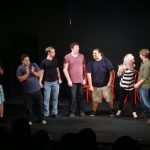
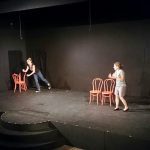
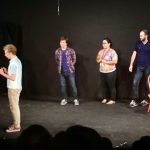
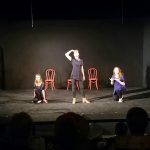
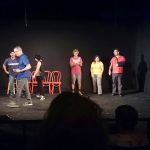
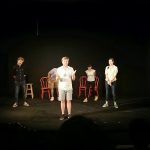
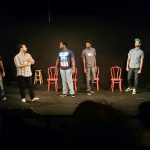


 This past weekend, I was very fortunate to be able to teach and perform with my group Switch Committee at the HUGE Theater in Minneapolis, Minnesota for Eighth annual Twin Cities Improv Festival. We had met Butch Roy, Co-Founder and Executive Director of Huge Theater, and Hannah Catherine Wydeven when they were performing as Michael Keaton at the Phoenix Improv Festival in April. We had talked about the possibility of Switch Committee coming out to Minnesota for the festival to which we all replied, in unison, “ABSOLUTLEY.” You could call it networking, but I just call it meeting new friends with the same interests as ours. Both of them are great. For the trip, we left at 9:30pm on Friday night and made the 6 ½ hour trek up to Minnesota. Despite some bumper to bumper nighttime construction and one lane highway traffic for a little while, it wasn’t that bad. We actually spent the ride singing 90s hits while I played DJ using Spotify. One continuous song I kept playing, for no reason whatsoever, was Haddaway’s “What is Love”. More on that…never.
This past weekend, I was very fortunate to be able to teach and perform with my group Switch Committee at the HUGE Theater in Minneapolis, Minnesota for Eighth annual Twin Cities Improv Festival. We had met Butch Roy, Co-Founder and Executive Director of Huge Theater, and Hannah Catherine Wydeven when they were performing as Michael Keaton at the Phoenix Improv Festival in April. We had talked about the possibility of Switch Committee coming out to Minnesota for the festival to which we all replied, in unison, “ABSOLUTLEY.” You could call it networking, but I just call it meeting new friends with the same interests as ours. Both of them are great. For the trip, we left at 9:30pm on Friday night and made the 6 ½ hour trek up to Minnesota. Despite some bumper to bumper nighttime construction and one lane highway traffic for a little while, it wasn’t that bad. We actually spent the ride singing 90s hits while I played DJ using Spotify. One continuous song I kept playing, for no reason whatsoever, was Haddaway’s “What is Love”. More on that…never.  Following breakfast, we arrived at HUGE and I must say, this place is BEAUTIFUL. I loved every single detail about the theater. There were writings on the wall (because the walls had dry-erase paint) and writings on the floor. Yes, there are things written on the floor like the words “theater” and “restrooms.” The reasoning behind this is because, according to Butch, “People tend to look down when they walk into a new place.” That’s genius! In addition, another cool factor, at the right angle (standing outside in front), you can see that the inside of the theater says ‘HUGE’ because there are giant letters on each of the walls inside.
Following breakfast, we arrived at HUGE and I must say, this place is BEAUTIFUL. I loved every single detail about the theater. There were writings on the wall (because the walls had dry-erase paint) and writings on the floor. Yes, there are things written on the floor like the words “theater” and “restrooms.” The reasoning behind this is because, according to Butch, “People tend to look down when they walk into a new place.” That’s genius! In addition, another cool factor, at the right angle (standing outside in front), you can see that the inside of the theater says ‘HUGE’ because there are giant letters on each of the walls inside. 



 Later that night we performed and jumped on and off of pretty much everything in the theater. We threw our bodies all over the stage and hung from the rafters because in that scene (justifiably) the building was on fire and later it was because we were stuck in a tree house. That scene involved carefully dropping me over the wall and down into my partner’s arms. A scene that, if it went wrong, would probably have been my last improv scene ever.
Later that night we performed and jumped on and off of pretty much everything in the theater. We threw our bodies all over the stage and hung from the rafters because in that scene (justifiably) the building was on fire and later it was because we were stuck in a tree house. That scene involved carefully dropping me over the wall and down into my partner’s arms. A scene that, if it went wrong, would probably have been my last improv scene ever.  Following the festival, there was an after-party at one of the local performer’s (Beard Men Improv) houses. Just another example of how warm and welcoming the Minnesota improv community is to out-of-town performers. We were invited to come to someone’s house, who we didn’t know, to hang out simply because we were all a part of a something together.
Following the festival, there was an after-party at one of the local performer’s (Beard Men Improv) houses. Just another example of how warm and welcoming the Minnesota improv community is to out-of-town performers. We were invited to come to someone’s house, who we didn’t know, to hang out simply because we were all a part of a something together. 






![improvutopiaeast[1]](http://www.nationalimprovnetwork.com/wp-content/uploads/improvutopiaeast1.png)
![DSC3092[1]](http://www.nationalimprovnetwork.com/wp-content/uploads/DSC30921-300x198.jpg) East coast improvisors have very different challenges than west coast improvisors. You definitely have some folks who cross the country, but how are you going to customize East Camp to the challenges of the east coast performers?
East coast improvisors have very different challenges than west coast improvisors. You definitely have some folks who cross the country, but how are you going to customize East Camp to the challenges of the east coast performers?

![thumbnail_1399617601-300x300[1]](http://www.nationalimprovnetwork.com/wp-content/uploads/thumbnail_1399617601-300x3001.png)



 I would like to start this by saying I grew up in the desert. December for me is 60s and a cactus with some lights. May not sound as romantic to you, but to me it’s the bees knees. It was also that December when I got a Facebook message from Rick Grove and Lauren Corl telling me we must go to Wisconsin (which was under piles and piles of snow) for the Improv Retreat with the one and only Tara DeFrancisco – who I had met for the first time on stage as a part of her show DeFrancisco. While I would like to say I thought long and hard about the snow, before I knew it, I clicked the link to pay and off my pay check went.
I would like to start this by saying I grew up in the desert. December for me is 60s and a cactus with some lights. May not sound as romantic to you, but to me it’s the bees knees. It was also that December when I got a Facebook message from Rick Grove and Lauren Corl telling me we must go to Wisconsin (which was under piles and piles of snow) for the Improv Retreat with the one and only Tara DeFrancisco – who I had met for the first time on stage as a part of her show DeFrancisco. While I would like to say I thought long and hard about the snow, before I knew it, I clicked the link to pay and off my pay check went.
